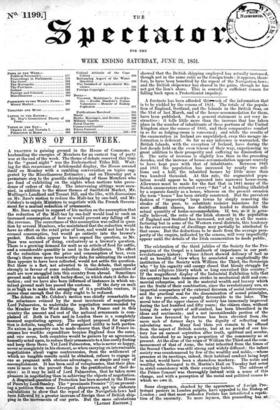NEWS OF THE WEEK.
A PRACTICE is gaining ground in the House of Commons, of husbanding the energies of Members for an earnest tug of party -war at the end of the week. The theme of debate reserved this time for the "grand night" was the Ecclesiastical Titles Bill. Wait- ing for this recurrence of hebdomadal display, the House amused itself on Monday with a rambling conversation on topics sug- gested by the Miscellaneous Estimates; and on Thursday put a premature stop to the guerilla skirmishing of those Members who are fond of exhibiting on the .nights when motions take prece- dence of orders of the day: The intervening sittings were occu- pied, in addition to the minor themes of Smithfield Market, Mr. Mailings's Landlord and Tenant Bill, and the like, with discussions on Mr. Bass's motion to reduce the Malt-tax by one-half, and Mr. Cobden's to enjoin Ministers to negotiate with the French Govern- ment for a mutual reduotion of armaments. Mr. Bass argued in support of his motion on the assumption that the reduction of the Malt-tax by one-half would lead to such an increased consumption of beer as would prevent any falling off in the revenue. The correctness of this assumption was called in ques- tion by several Members, who maintained that the reduction would have no effect on the retail price of beer, and would not lead to in- creased consumption, but would go entirely into the brewer's pocket. Both sides appear to have argued the question, as Mr. Bass was accused of doing, exclusively as a brewer's question. There is a growing demand for malt as an article of food for cattle,' :alba' a considerable quantity is used in the distilleries. The effect of the reduction upon the price and consumption of beer, even thoutga there were more trustworthy data for estimating its extent than appears to have been collected, would not settle the question. But there a fact, not adverted to in the debate, that speaks strongly in favour of some reduction. Considerable quantities of ,malt are now smuggled into this country from abroad. Sometimes ground malt is mixed with barley-flour, in which state it defies de- tection; and we have also heen informed of instances in which an- 'mixed .ground malt has passed the customs. If the duty on malt is solicearas to make the smuggling of it a profitable venture, it seems enough that the ditty ought to be reduced. The debate on Mr. Cobden's motion was chiefly remarkable for the reluctance evinced by the most inveterate of negotiators, Lord Palmerston, to undertake the negotiation recommended by 'the Member -for the West Riding. Both in France and in this country the amount and cost of the national armaments is com- plained of. Both in Paris and in London there is a completely manned negotiating agency. The subject proposed for negotia- tion is definite, tangible, and of recognized utility to both parties. No axiom in geometry can be made clearer than that if France in- creases her warlike expenditure because England does the same, and vice versa, both countries would be gainers by anagreement, honestly acted upon, to reduce their armaments to a less costly footing and keep them there. Yet Lord Palmerston, who is never so happy, never so completely in his element, as when carrying on interminable negotiations about vague controversies, from the settlement of which no tangible results could be obtained, refuses to engage in one so pregnant with obvious advantages, so simple and easy of accomplishment. It has been said of voluptuaries, that their plea- sure is more in the pursuit than in the gratification of their de- sires: so it may be said of Lord Palmerston, that he takes more pleasure in negotiating than in achieving the objects of negotiation. A disguised question of Protection has been mooted in the House of Peers by Lord Stanley. The "proximate Premier" (P) on present- ing a petition from some Liverpool shipowners, [cot up elaborate calculations to show that the repeal of the Navigation-laws had been followed by a greater increase of foreign than of British ship- ping in the movements of our ports. But the same calculations showed that the British shipping employed has actually increased, though not in the same ratio as the foreign trade: it appears, there- fore, to have been benefited by the repeal of the Navigation-laws; and the British shipowner has shared in the gains, though he has not got the lion's share. This is scarcely a sufficient reason for falling back upon a Protectionist impolicy.


























